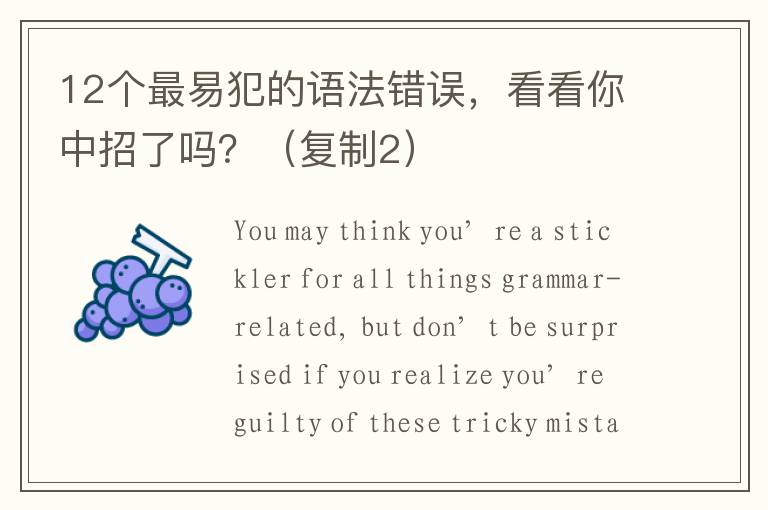
You may think you’re a stickler for all things grammar-related, but don’t be surprised if you realize you’re guilty of these tricky mistakes.
你可能觉得自己坚定支持语法一定要对,但是以下这些错误可能是你的死角,千万别诧异哟。
You probably mean “I couldn’t care less,” which means that you flat out don’t care at all. You care about whatever that thing is—say, grammatical errors—in the least possible amount. If you could care less, then you do care about grammatical errors a little bit, and it would technically be possible for you to care even less than you do now.
可能本来想说:“我贼关心这事儿(I couldn’t care less)”,想表达自己对某语法错误事无巨细的关怀,但是其实是在说不关心语法错误。“could care less”是说你只有一点点在意语法,而且传递出以后可能对这方面的注意力会更少。
People have started using this incorrect saying because it sounds just similar enough to the original expression, which is the cause of many grammatical errors. The correct expression, in this case, is “for all intents and purposes.” According to Business Insider, it came from an old English law that used the phrase “to all intents, constructions, and purposes” to mean “officially” or “effectively.” The condensed version we use today means “in every practical sense.”
大家使用这个错误语法可能是因为它听上去和原版非常像,但是其实满是尬点。正确的说法是“for all intents and purposes(实际来看)”。美国知名科技博客中说,“for all intents and purposes”来自古英语法,“为了所有意图、结构、目的”这个短语是要表达“正式、有效”。我们今天延用的简略版是“in every practical sense”。
Usually, you cite a specific case in order to make a point about something; they don’t happen simultaneously. That’s how you can remember that the correct expression of this sentiment: case in point.
通常举例是为了引出论点。两者不会同时发生。这也是记住正确表达“case in point”的方法。
You already know to use this spelling when writing about huge furry mammals of the grizzly or polar variety, but the difference between bare and the other definition of bear can be confusing. As an adjective, bare means not clothed or basic and simple. The verb bare means to uncover or expose something. Bear as a verb means to carry or hold up something for support.
写作提到灰色或者极地皮毛哺乳动物时大家都知道要用这个词,但是这个词的其他意思和“bare”不太好区分。做形容词时,bare表示裸露的、基础的、简单的,作动词时,bare表示揭露。而bear作动词时表示支撑。
Sorry gardeners, this is the incorrect spelling of this adjective. The right way to describe something that is firmly established at a deep or profound level is deep-seated.
对不住各位园艺工,这个词拼写错误。正确写法是“deep-seated”表示某物坚实的建立于较深层次。
This grammatical error is likely a combination of “piece of my mind” and the correct version of this phrase, “peace of mind.” The latter refers to a feeling of being safe and protected; it is an absence of worry.
此处的语法错误看起来是因为把“piece of my mind”和该短语正确写法“peace of mind”结合了起来。后者表示安全感,毫无焦虑。
Like many grammatical errors, this phrase seems perfectly normal. It means that your interest has reached its highest level, its peak, no? No, it doesn’t. The correct saying is “piqued my interest,” where “piqued” means “aroused or excited.”
这个短语和很多语法错误一样,看起来很好。难道它是说你的兴趣达到峰值的意思吗?不,并不是这个意思。正确说法是“piqued my interes”,“piqued”意为“激起、激发”。
At first glance, you probably believe this word to mean “thaw out.” But let’s take a closer look. When something thaws, it gets warmer because it was previously cold or frozen. Unthaw, then, must mean the opposite; it’s making something get colder or re-freezing. The next time someone tells you to unthaw the chicken, just leave it in the freezer.
第一眼看上去这个词好像是“暖和起来(thaw out)”的意思,仔细再看,当某样东西温度升高,说明它此前是凉的或者处于冷冻状态。所以“Unthaw”肯定是其反义,表示某物正在变得更冷或是再次冰冻。要是下次有人和你说“unthaw the chicken”,就把鸡肉放在冰冻层吧。
Whoever decided to make emigrate and immigrate such similar sounding words must have liked creating utter confusion. Emigrate means to leave one’s country for another, in other words, to come from somewhere. Immigrate means to come to another country, or to go somewhere else. Therefore, the phrase “emigrate to” makes no sense; you can only emigrate from a place. Likewise, you can only immigrate to a new country.
喜欢把“emigrate”和“immigrate”发成相思音的人肯定有发音混淆的问题。“emigrate”指离开自己的国家去往别国,是说来自其他地方“immigrate”是来到另外一个国家,或者去其他地方。“emigrate to”毫无意义。我们只能“emigrate from”某地。所以只有到达新的地方才能用“immigrate to”。
You may think you are honed in on your end-of-quarter presentation, but you’re not. You are homed in. “Hone” means to sharpen.
你可能觉得自己终于到了演讲结尾了,但事与愿违。“homed in”才有此意。“Hone”表示使锋利。.
The correct expression is nip it in the bud. Since nip means to pinch or bite, “nip it in the bud” means to suppress or end something at an early stage, just as a bud is an early stage of a flower. Why anyone would want to literally nip something or someone in the butt, we’re not sure.
正确说法是“nip it in the bud”,“nip”意为掐、咬,所以这个短语是指在某事发展初期就使其终止,“bud”就指花蕾、花苞。至于为什么有人想掐别人、某事的屁股呢,我们也不是很清楚咯。
That strong coffee served in little cups you love so much is actually espresso, not expresso. Merriam-Webster says the misspelling came from the similarities between the Italian word “espresso” and the English word “express,” plus the “promise of coffee being prepared with relative swiftness in contrast to percolating devices.” However, “expresso” was used enough to be entered into the dictionary, even though it’s not what the drink was originally called.
你最爱的超浓咖啡其实是“espresso”,不是“expresso”。《韦氏词典》创始人说这个拼写错误来自于意大利单词“espresso”和英文单词“express”过于相似,以及“保证咖啡会很快做好,而不是用机器慢慢做”。但是“expresso”以前也常被收入词典,即使它是错误表达。
(翻译:阿忙)